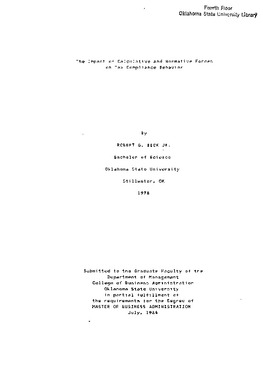| dc.contributor.advisor | Greer, Charles R. | |
| dc.contributor.author | Beck, Robert G., Jr. | |
| dc.date.accessioned | 2016-05-16T18:16:19Z | |
| dc.date.available | 2016-05-16T18:16:19Z | |
| dc.date.issued | 1984-07 | |
| dc.identifier.uri | https://hdl.handle.net/11244/34711 | |
| dc.description.abstract | Scope and Method of Study: This study measures the impact of various subvariables of normative and calculative restraining forces on compliance with tax legislation. The subvariables for normative forces are: acceptance of authority, need-determined expression vs. value-determined restraint, equalitarianism and individualism. The subvariables for calculative forces are: probability of getting caught, costs of compliance and benefits of non-compliance. Five hundred questionnaires were mailed to executives from Fortune 500 companies to obtain data analysis. | |
| dc.description.abstract | Findings and Conclusions: Two variables entered the regression analysis to explain compliance behavior. The first variable, cost of compliance, was positively related to non-compliance behavior and was significant at p < 01. Need-determined expression vs. value-determined restraint was the other significant variable. It was negatively related and had significant at p < 10. | |
| dc.format | application/pdf | |
| dc.language | en_US | |
| dc.rights | Copyright is held by the author who has granted the Oklahoma State University Library the non-exclusive right to share this material in its institutional repository. Contact Digital Library Services at lib-dls@okstate.edu or 405-744-9161 for the permission policy on the use, reproduction or distribution of this material. | |
| dc.title | Impact of calculative and normative forces on tax compliance behavior | |
| osu.filename | Thesis-1984R-B393i.pdf | |
| osu.accesstype | Open Access | |
| dc.type.genre | Master's Report | |
| dc.type.material | Text | |
| thesis.degree.discipline | Business Administration | |
| thesis.degree.grantor | Oklahoma State University | |
